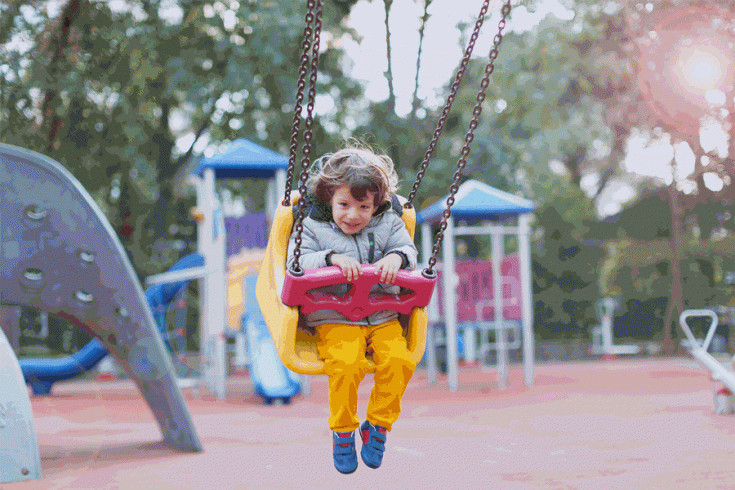On my kids’ first day of school this past fall, I snapped a bunch of photos. I intended, like so many proud parents, to share some of them on Facebook and Instagram. But, when I showed Leo, my eight-year-old, a cute shot of him and his little brother in their specially chosen new clothes, he told me he didn’t want me sharing his image on social media.
I was taken aback, but I agreed to keep Leo’s pictures offline. (At least my younger son, who was four at the time, was okay with me posting his first-day-of-junior-kindergarten shot.) Later, I asked Leo to explain. “I just didn’t feel like I wanted it posted,” he told me. Though he didn’t explicitly say so, I got the sense that he was becoming more aware of his image and wanted to have a say over what I shared about him and with whom. His days were and still are governed by other people’s rules, but this was one area he felt he could control.
While I’ve always endeavoured to be thoughtful about the kinds of images and information I share about my kids online, this experience, a first for me, prompted me to think a little more deeply about my kids’ requests and what I think is reasonable. So I’ve had to recalibrate. Even now, several months later, I still have to stop myself before automatically posting pictures I take of Leo. And shots I thought would be okay—like a Facebook memory of him on a swing as a baby—have gotten a “no” from him.
As Facebook turns fourteen, with Twitter, Instagram, and Snapchat following closely behind, it’s a pivotal time to be thinking about children’s rights online. Over the years, parents around the world have shared posts about their children, from first steps to tantrums to hilarious moments (“Charlie bit my finger!”). Kids who are now old enough to have their own social-media accounts—the minimum age for a Facebook is thirteen—have likely had most of their lives documented and curated online, largely without their permission or input.
What some now call “sharenting” began well before we really knew the potential impact of social media. In the past few months, I’ve wondered how my sharing photos of Leo might affect him now and in the future—and how holding back might affect me. Maybe the problem with sharenting, I’ve realized, is that it’s far more about the parents than it is about their kids.
Canadian parents aren’t likely to face legal consequences for sharing images of their kids, says David Fraser, a technology and privacy lawyer with McInnes Cooper in Halifax. Canada doesn’t have specific laws that cover unreasonable invasion of privacy; it’s the common law that gives people the ability to sue for this, he explains. So while your kid could possibly sue you, when they become an adult, for circulating pictures of them on social media, they would likely have to show that your ability to consent on their behalf could be challenged in court, and it would take an extreme case for them to prove that.
But, as a parent of three, Fraser adds, he believes that once a child expresses any preferences regarding their online presence, it’s important for parents to respect their wishes. If nothing else, he says, it’s a way to protect their psychological well-being and teach them about boundaries.
“People will say, ‘Well, privacy is dead. Everybody is sharing everything on social media, get over it.’ And that has not been my experience,” he says. “I remember when my eldest son turned fourteen, he unfriended me on Facebook—that’s a pretty definitive move to protect his privacy.”
Fraser’s son’s action is not out of the ordinary. Becoming social-media savvy—and developing their own set of rules that help them control their online identity—is par for the course for many teenagers today. My friend’s fifteen-year-old daughter, Angelina, has more than 1,500 followers on her Instagram account, wifixroyalty. She says most kids her age “definitely” care about their image on social media and most Instagram users she knows “are very specific about what they’re posting and who’s going to see it.” She’s decided that her mom can post whatever pictures of Angelina on her own account, as long as Angelina can curate which photos she’s tagged in. “If I don’t like it, I’ll just tell her to remove the tag, so it doesn’t show up on my profile,” she explains. And Facebook? “On Facebook, she can post whatever she wants,” she says. “No one my age is on Facebook.”
I don’t know if kids Leo’s age are as primed for social media, but one incident strengthened my understanding that the next generation are pushing back on having their lives documented. A friend told me she’d been visiting High Park in Toronto with her nine-year-old son one summer day when she noticed a few girls she guessed were around eight to ten years old hiding in some bushes. When she asked them why they were hiding, they told her it was because they were sick of their parents taking pictures of them to post on Facebook.
Embarrassing your kids is one thing. But there are more frightening possibilities to consider about what others can do when we let something slip through the privacy cracks. The Canadian Centre for Child Protection, which operates the website cybertip.ca, a site for reporting child sexual exploitation, has found that a small subset of incidents they’ve investigated have involved images of children innocently posted online that were then exploited for child pornography.
There are far less sinister, though still potentially harmful, consequences of sharing children’s images online. Last December, Kimberly Jones of Tennessee posted a public video on her Facebook page of her eleven-year-old son, Keaton, at his urging, tearfully complaining about being bullied at school. It got millions of views and, initially, positive attention: the actor Chris Evans invited Keaton to the Avengers: Infinity War premiere, Justin Bieber made an Instagram video in support, and a now suspended GoFundMe page was created for the family. But the tide turned, seemingly at whip speed, when pictures publicly posted on Jones’s Facebook page of Keaton and some members of his family posing next to a Confederate flag came to light. Later, racist Facebook posts by Keaton’s estranged father were also exposed.
While I can’t claim to know what Jones had in mind when she posted that video, it made me reflect on my own behaviour. If I’m honest with myself, I realize some of what I post is more about my ego than it is about what’s best for my kid. Jones may have been proud of Keaton for saying what he did, but her actions opened him up to a world of controversy. Even if the video had been Keaton’s idea, maybe she should have said no, for his own sake. Maybe, as parents, we should say no to ourselves more often.
But how do we decide when it’s best to say no? I turned to Andrew Franklin-Hall, a professor of philosophy at the University of Toronto and the father of a one-year-old and a four-year-old, for insight.
“Young children probably don’t care what you say about them,” he says. “But then there’s the question about what they’ll think later on. So one question you might ask yourself is: What would you want posted about yourself?” But, he adds, your preferences will likely change with age. “You want to make decisions that open up their opportunities, not close them down.”
Michael Lawson, a friend of a friend, offered a compromise: he posts pictures of his three-year-old twin daughters on a private Instagram account he created solely to share kid pics. “That way, anybody who opted to follow it would know what they were getting into,” he explains, adding it’s likely his Facebook and Instagram contacts wouldn’t all want to be deluged with images of his daughters—especially because some friends or family may be having a tough time trying to conceive.
He’s also going to give the girls a chance to weigh in on the account when he feels they are capable of having a conversation about it—at which point, he says, he hopes to have already started discussing how to use social media with them. If he learned they were uncomfortable with anything he’d posted about them, he says, “I would definitely take it down.”
Lawson’s approach exemplifies the right to be forgotten, a concept that’s gotten more attention in Europe than in North America, explains Fraser. It’s based on the recognition that individuals should be able to detach themselves from the legacy of what is posted about them online, he says. The European Union will be introducing legislation at the end of May that will force companies to delete any social-media posts a teenager made when they were underage if specifically requested. Already, within the EU, Google offers users the option to request that personal information be removed from its search results for privacy purposes. Facebook and Instagram officials have stated they will comply with the new legislation.
In Canada, where our laws don’t cover potential privacy violations that could come from a parent sharing an image of their kid on social media, that means little. But change could be on the horizon here. The Office of the Privacy Commissioner of Canada just released a draft report on online reputation that recommends Parliament make it easier for youth to get information they’ve posted on social media deleted. And, once they become adults, the same would apply to information their parent or guardian posted about them online.
There are some benefits to sharenting that I wouldn’t want to discount. Sara Marlowe, a clinical social worker in Toronto and the mother of two young children, teaches mindfulness to kids and families. She says sharing updates and photos of our kids has value similar to the argument for being on social media at all: it’s a way to keep in touch with far-flung friends and family. But she suggests taking a moment to reflect before uploading a photo.
“A lot of times it is because of genuine pride and love for our children—we really want to share the wonderful moments,” she says. “It’s not that posting is inherently bad, it’s just weighing out the potential risks.” She never uses features, such as GPS check-ins, that could identify her family’s location, and the few pictures of her kids on Facebook don’t include their names. But she also considers her children’s emotional well-being, so she tries to limit potential embarrassment. “The difficulty is that once you post something online, it’s there forever and you never know who is reading it,” she explains.
That’s especially significant when not all social-media posts about kids are pride-filled first-day-of-school photos. Sometimes, I feel the need to blow off steam on social media about the not-so-wonderful moments, like when the kids are in meltdown city or when they lose their winter hat for the millionth time. “Regardless of the personalities or behaviours of our children, it’s inevitable that we will have our buttons pushed and our patience tried in some way,” says Marlowe. “So, when I’m writing about an experience on social media, I stay focused on the impact on me and my responses rather than getting into specifics about what my children did. In many ways, it doesn’t matter as much.”
And a lot of people, myself included, turn to Facebook groups filled with a mix of strangers, acquaintances, and friends for parenting advice. Sometimes those specifics are important to working through your frustration, finding an answer to a problem, or feeling a bit less lonely about what you’re going through. In those cases, I try to leave out as many identifying details as I can.
It’s still hard to resist oversharenting, especially since most social-media platforms are designed to keep users engaged by encouraging them to contribute content. I’ve been there. Maybe I’ve had a crappy day and know I’ll get a bit of validation by posting a sweet shot of one of my two kids. But the truth is our kids don’t belong to us. We are merely their guides for a relatively short time in their lives. So, even if I have the legal right to share my kids’ personal details, I know I need to think carefully about the broader implications of those decisions before I post. Perhaps it’s time to trade a like for a no.





